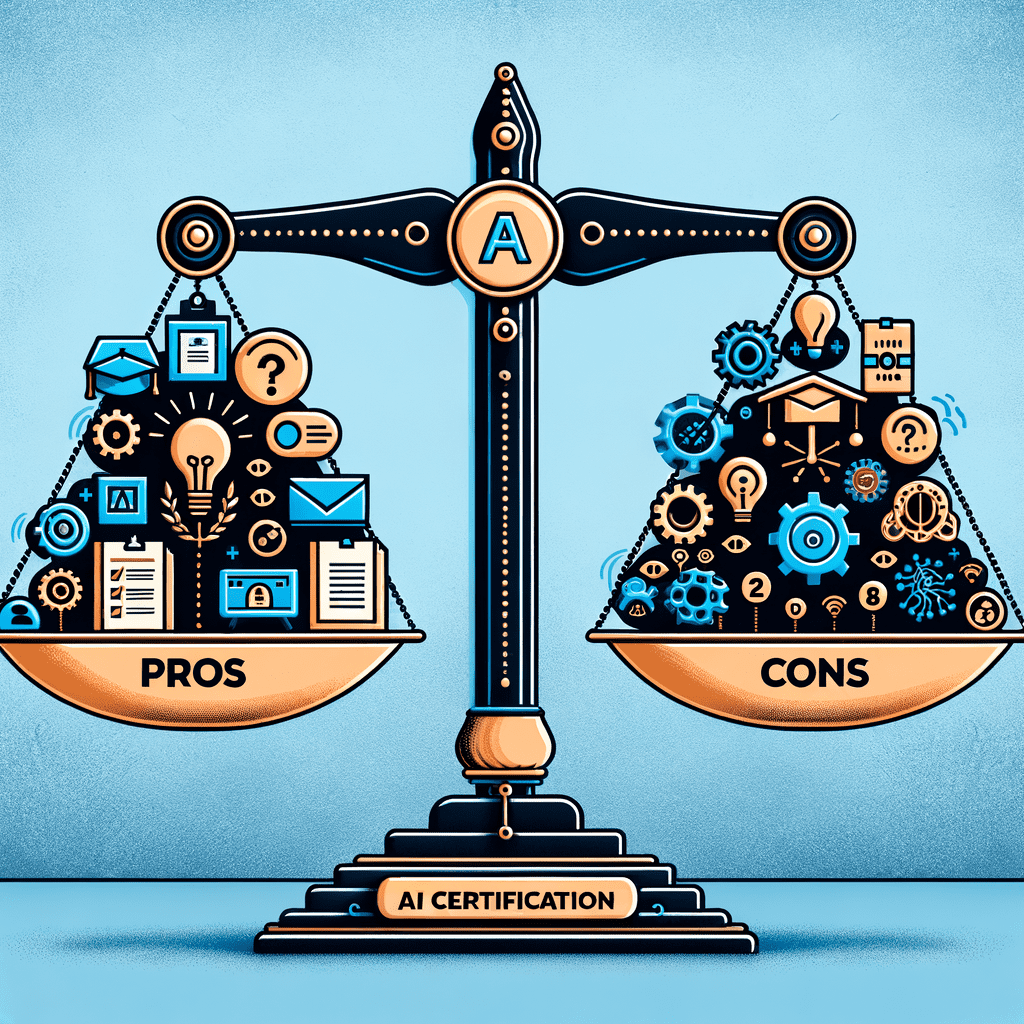With the rise of AI, many wonder, are AI Officer certifications worth it? This question weighs on the minds of professionals eager to jump into this fast-growing field. Some might be hesitant, recalling the dot-com bubble burst. Others are worried they lack the technical skills needed. We’ll explore these concerns and whether AI certifications offer a clear career advantage. AI Officer certifications: Are they worth it? Let’s find out.
"The Growing Demand for AI Professionals and Certifications"
The job market is buzzing about AI. Job posts mentioning AI skills have recently increased, as noted in a Randstad report.
This surge isn’t just hype. Over 40% of HR managers predict a skills gap in AI, according to TalentLMS research. Companies are seeking professionals with AI skills who can harness AI’s power. This includes individuals skilled in areas like machine learning, deep learning, and natural language processing. These professionals help build AI systems for diverse fields.
Even those not directly in AI roles still benefit from AI knowledge. Tech career coach Kyle Elliott stresses understanding AI’s impact, regardless of your job. Knowing how AI works, how it affects your role, and how it fits your company’s plans matters.
From accounting to challenging technical roles, understanding AI is crucial. For aspiring AI professionals, this understanding can open doors to various job opportunities. Therefore, obtaining an AI certification has become a popular way to gain knowledge.
Navigating the Landscape of AI Certifications: Are They Worth It?
AI certifications help bridge the AI skills gap. They provide a grasp of core AI concepts, including those of data science. However, certifications don’t make someone an instant expert, clarifies Kumar Muthuraman, faculty director at UT McCombs School of Business. He points out that certifications cover AI foundations, but continuous learning in the AI field is essential.
Like any career investment, determining if AI certifications are worth it means comparing their cost against potential job gains and increased pay. These credentials can cost from a few hundred dollars to thousands. Weigh these expenses against the AI market’s potential, projected to reach nearly $800 billion by 2030, according to Statista. This market growth signals significant opportunities.
Top AI Certifications to Consider
So, which certifications offer a good mix of quality and relevance? The table below highlights prominent certification options that many find attractive.
| Certification | Provider | Focus | Cost |
|---|---|---|---|
| Certified Artificial Intelligence Scientist (CAIS) | The United States Artificial Intelligence Institute (USAII) | AI strategy, business applications | $894 |
| Artificial Intelligence Certification | ARTIBA (Artificial Intelligence Board of America) | Technical AI skills, machine learning, natural language processing (NLP) | $550 |
| Microsoft Certified: Azure AI Engineer Associate | Microsoft | Azure AI services, building AI solutions on Azure | $165 |
| Jetson AI Courses and Certifications | NVIDIA Developer | AI on NVIDIA Jetson platform, Edge AI, machine learning (ML), deep learning (DL) | Free (Hardware costs vary) |
| Intel Edge AI Certification | Intel | Edge AI solutions using Intel technology | $99 per year |
AI Officer Certifications: Are They Worth It? Weighing the Pros and Cons
Certifications provide structured learning, a definite plus for those exploring AI concepts. They validate your skills, which can attract employers seeking AI talent. Plus, preparing for certification keeps you updated on the latest developments and trends in AI.
However, some employers value experience over certifications. Companies like Google and Microsoft offer free courses related to machine learning and other areas. This suggests certifications aren’t the sole measure of AI skills, based on information from the Microsoft Tech Community and the IBM training site. Focus on building practical skills.
Consider skills like Python programming for AI, fundamentals of machine learning, and deep learning algorithms. Look for learning experiences, volunteer projects, or boot camps to practice AI project management and showcase real-world abilities.
The value of AI officer certifications also depends on career stage. Early-career professionals might use certifications as a stepping stone. For senior roles, employers prioritize practical AI project experience over certifications.
Essential AI Skills Beyond Certifications
Focusing solely on certifications overlooks broader AI career needs. While certifications provide an overview, practical AI work requires skills in areas like machine learning, deep learning, natural language processing, and generative AI. Additionally, strong communication skills are essential for explaining complex technical concepts clearly.
A Microsoft Work Trend Index highlights the importance of analytical thinking, adaptability, emotional intelligence, and ethical considerations in AI, such as bias detection. These skills are important even in tasks like crafting effective AI prompts. AI expertise requires a blend of technical and soft skills.
Certifications are one path toward career growth in the expanding field of AI. However, there are many other valuable avenues for gaining AI skills, including practical experience, projects, and staying updated with the latest AI tools and technologies. Explore diverse AI resources to enhance your knowledge and career prospects.
FAQs about AI Officer certifications: Are they worth it?
Are AI certifications worth it?
The value of AI certifications depends on your career goals, current skills, and the specific certification. They can validate skills and enhance your resume, but practical experience is also essential. Weigh the cost versus potential career benefits. Consider free resources, projects, and experience alongside certifications.
What is the best certification to get for AI?
The “best” AI certification varies based on individual career paths and interests. The USAII’s CAIS certification focuses on business applications of AI. ARTIBA’s certification emphasizes technical AI skills, including NLP and language processing. The Microsoft Azure AI Engineer Associate certification focuses on using Microsoft’s Azure AI technologies for implementing solutions and projects.
There’s no single “best” certification; choose the one aligned with your goals. For those interested in cloud computing, explore Azure AI and other related areas. For professionals specializing in language models, certifications covering NLP, human language, and language processing are beneficial.
Is doing an AI course worth it?
Similar to certifications, a course’s value depends on your learning goals. Some providers, like Google and Microsoft, offer free courses on various AI technologies, which can be valuable. Look for reputable programs that match your desired areas of expertise. These programs include specialized training in AI concepts, techniques, and specific AI tools.
Ultimately, AI learning is valuable. The worth of courses or certifications often ties into how well they contribute to career progression and enhancing professional abilities.
Is getting a job in AI worth it?
An AI career is ideal for those who enjoy continuous learning in a fast-paced environment. The AI field is rapidly evolving, with new technologies frequently emerging. If you thrive in a dynamic environment, a job in AI can be rewarding. An AI career path could involve roles like machine learning engineer, AI consultant, data scientist, or other emerging AI-related positions.
However, if staying up-to-date with constant changes feels overwhelming, an AI career might not be the best fit. For individuals seeking stability, there are other career paths within the broader tech industry that might be a better choice. Consider exploring traditional software development roles or fields less affected by rapidly changing trends.
Conclusion
So, are AI Officer certifications worth it? The answer depends on your individual circumstances. While industry demand for AI professionals is increasing, certifications alone don’t guarantee success. AI requires skilled professionals, and building a strong foundation in AI technologies is crucial.
Certifications can be helpful but aren’t a magic solution. A well-rounded approach includes practical skills development, real-world projects, and continuous learning. Combine technical skills with the essential abilities mentioned earlier. Think of certifications as a potential supplement to a broader learning strategy. Carefully consider your overall career plan and learning path.
Ultimately, focus on gaining practical experience and developing projects. Certifications can then add value to your credentials. Continuously updating your knowledge and engaging with AI projects will contribute significantly to a fulfilling and successful AI career. Learning engineer, data scientist, and AI expert are among the many promising career opportunities.






